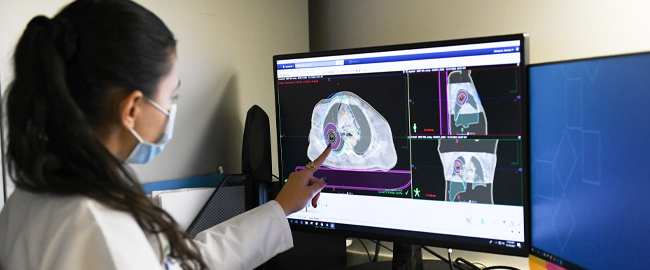Interventional Radiology in New Jersey
Minimally Invasive Radiology Care
Hackensack Meridian Health provides Interventional Radiology care throughout New Jersey. Our Interventional Radiologists use advanced imaging technology and minimally invasive techniques to diagnose and treat various medical conditions.
Our team performs a wide range of procedures, including embolizations to treat malignant tumors, benign growths, or to stop life-threatening bleeding. We also perform biopsies to diagnose certain types of cancer, implant devices to administer chemotherapy, place drainage catheters to manage infections, and perform image-guided ablations to treat cancers in the organs, bones or soft tissues. Since we use minimally invasive techniques, it means less time in the hospital recovering and more time enjoying your life.
What is Interventional Radiology?
Interventional Radiologists perform minimally invasive procedures using advanced imaging techniques. They insert small needles or tiny catheters through small incisions and use X-ray, CT scan or Ultrasound guidance to target areas in the body for diagnosis or treatment.
Benefits of Interventional Radiology
Because Interventional Radiology procedures are minimally invasive, they offer many benefits, including:
- Targeted Treatment: Advanced imaging allows interventional radiologists to deliver targeted treatments.
- Faster recovery: Since Interventional Radiology procedures involve smaller incisions, the recovery time is faster than that of traditional open procedures. In many cases, local anesthesia or light sedation is used rather than general anesthesia during Interventional Radiology procedures. This can minimize side effects and allow for a shorter recovery time.
- Minimally invasive: Some patients may not be candidates for traditional surgery or general anesthesia. Minimally invasive image-guided Interventional Radiology techniques can help minimize or avoid risks.
- Less pain: Smaller incisions made during Interventional Radiology procedures mean less trauma to tissue. This results in less pain and faster recovery.
- Lower complication rates: Studies have shown that Interventional Radiology procedures result in fewer infections, bleeding and better outcomes than traditional procedures.
- Shorter hospital stays: Interventional Radiology procedures are usually performed on an outpatient basis without an overnight stay.
Conditions We Treat
- Uterine fibroids - These common, non-cancerous growths along the lining of the uterus can cause pain, vaginal bleeding, and infertility.
- Prostate enlargement (Benign prostatic hyperplasia, BPH) - As men age, their prostate can enlarge, causing urinary issues such as urinary frequency, urgency, hesitancy, nocturia, weak stream, or incomplete bladder emptying.
- Angiomyolipoma - A benign tumor that’s generally found within the kidney that can cause pain, bleeding and even kidney failure if left untreated.
- Osteoid osteoma - A benign tumor typically found in the long bones of the arms and legs. It can cause severe pain, especially at night.
- Liver cancer - Cancers that arise within the liver itself or cancers that metastasize to the liver from other organs in the body, such as the colon, breast, lung, kidney or pancreas.
- Hemorrhoids - This condition causes swollen veins in the lower anus and rectum that lead to itching, pain and bleeding.
- Varicocele - Varicocele occurs when there’s an enlargement of the veins within the scrotum.
- Pelvic congestion syndrome - Pelvic congestion syndrome is a chronic condition caused by enlarged veins in the pelvic region. It can lead to pelvic pain or pressure that might worsen over the day or with prolonged standing.
- Knee osteoarthritis - Knee osteoarthritis is a joint disease in which the cartilage between the knees wears down, leading to inflammation, pain around the bones of the knees, and decreased mobility.
- Vertebral compression fracture - The collapse or compression of a vertebra in the spine results in pain, decreased mobility and slouched posture.
Interventional Radiology Procedures We Perform
- Biopsy - We use imaging guidance to perform minimally invasive biopsies.
- Chemoembolization - During chemoembolization, safe doses of chemotherapy are delivered directly to the tumor via the blood vessels that supply those tumors. The treatment also blocks blood flow to the tumor, cutting off nutrients and oxygen. Targeted chemoembolization helps reduce side effects associated with traditional chemotherapy.
- Yttrium 90 Radioembolization - This procedure treats liver tumors by delivering tiny radiation beads targeted directly to the tumor via the blood vessels that supply those tumors. This helps avoid damage to normal tissues that surround the liver, which may be seen with traditional radiation therapy.
- Tumor Ablation - Tumor ablation uses special needles to create extreme heat or cold to destroy tumors directly.
- Aliya ablation - This minimally invasive procedure uses a pulsed electric field to destroy tumors, without extreme heat or cold.
- Uterine Fibroid Embolization - Uterine Fibroid Embolization blocks the blood flow to fibroids, causing them to shrink and reducing symptoms of vaginal bleeding, pelvic pain or pressure.
- Uterine Artery Embolization - This alternative to hysterectomy, myomectomy or ablation can be performed to treat uterine adenomyosis.
- Fallopian tube recanalization - This minimally invasive procedure opens blocked fallopian tubes in women who experience infertility.
- Prostate artery embolization - Prostate artery embolization blocks blood flow to the enlarged prostate, shrinking the prostate and improving urine flow.
- Varicocele embolization - During this procedure, a catheter is inserted into the groin and used to deliver medication that redirects blood flow.
- Genicular artery embolization (GAE) - A non-surgical treatment for osteoarthritis, GAE blocks abnormal blood vessels in the knee to reduce pain and swelling. Patients who have not had relief from steroid or gel injections in the knee may benefit from GAE. The procedure may allow people to avoid or postpone total knee replacement surgery.
- Pulsed Electric Field ablation - This procedure uses pulsed electric fields to treat tumors in the organs and soft tissues.
- Hemorrhoidal artery embolization - During this procedure, small particles, coils or glues are injected into the blood vessels supplying the hemorrhoids to block the vessels and shrink the hemorrhoids.
Bone ablation - This procedure uses heat or cold to kill abnormal bone tissue, reduce pain, or treat bone tumors or other lesions. - Portacath/Chest Port placement - Portacaths are placed under the skin in the chest, upper arm or abdomen and are used for long-term intravenous access. They reduce the number of needle sticks necessary. They are commonly placed for patients requiring long-term chemotherapy, IV fluids or transfusions.
- Fine needle aspiration - This minimally invasive biopsy uses a very thin needle to collect cells or fluid for examination.
- Kyphoplasty - Kyphoplasty is used to treat spinal vertebral compression fractures. During the procedure, a needle and balloon are inserted into the vertebrae, allowing the surgeon to inject bone cement to repair the fractures and stabilize the bone.
Frequently Asked Questions
Interventional Radiology uses minimally invasive, image-guided procedures to treat a wide range of conditions, including:
- Tumors
- Uterine fibroids
- Enlarged prostate (BPH)
- Varicose veins
- Joint and spine pain
- Vascular abnormalities.
Your Interventional Radiologist will recommend the most appropriate procedure based on your diagnosis.







